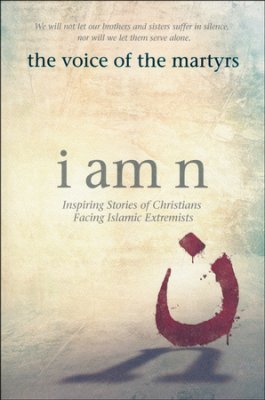[See books in the Bible Gateway Store on the subject of Christian persecution]
The International Days of Prayer for the Persecuted Church (#IDOP) is a time set apart to remember millions of Christians around the world who face persecution for their faith in Jesus Christ.
[See the Bible Gateway Blog post, International Day(s) of Prayer for the Persecuted Church]
Continue to remember those in prison as if you were together with them in prison, and those who are mistreated as if you yourselves were suffering.
Hebrews 13:3 (NIV)
“Persecution is the daily reality of at least 100 million Christians around the world,” says Godfrey Yogarajah, executive director, World Evangelical Alliance, Religious Liberty Commission (@WEARLC1). “These Christians, who face routine harassment and difficulties, often suffer in silence and isolation. Over the years, the IDOP has served as a platform to highlight their stories and advocate their plight. Moreover, in so doing, the IDOP has also been a source of solidarity and encouragement to persecuted Christians by reminding them that they are part of a larger, global family of believers.”

[See the Bible Gateway Blog post, I Am N: An Interview with Cole Richards and Jason Peters]
…We are experiencing all kinds of trouble, but we aren’t crushed. We are confused, but we aren’t depressed. We are harassed, but we aren’t abandoned. We are knocked down, but we aren’t knocked out. We always carry Jesus’ death around in our bodies so that Jesus’ life can also be seen in our bodies….
2 Corinthians 4:8-12 (CEB)
While the number of Christians martyred for their faith every year is difficult to precisely assess, Open Doors USA estimates that, in 2015, more than 7,000 Christians were killed specifically because of their faith. Open Doors, with its list of countries where Christians are most in need of prayer, urges Christians and churches to remember those killed and pray for those in more than 60 countries still facing persecution because of their faith (see the Open Doors Facebook page).
“Under Caesar’s Sword” is a three-year, collaborative global research project by the University of Notre Dame to discover and draw attention to the ways Christian communities around the world respond to the severe violation of their religious freedom. These strategies vary widely, ranging from nonviolent protest movements of the kind that Pope John Paul II led in communist Poland, to the complex diplomacy of Christian churches in China, to simply fleeing from persecution en masse, as Christians have in Iraq. The project aims to raise solidarity with persecuted Christians worldwide and to help them respond justly and effectively. Watch the documentary film.
The above slide presentation is a production of the Office of Social Justice, a ministry of the Christian Reformed Church.
The following organizations have resources ready to help you help others become more prayerfully aware of the plight of Christian brothers and sisters around the world:
- Bible Gateway Twitter List: Religious Freedom
- Christian Freedom International (@CFI_Freedom)
- Christian Solidarity Worldwide (@CSW_UK)
- Critical Prayer Requests
- IDOP
- International Christian Concern (@persecutionnews)
- Open Doors UK (@OpenDoorsUK)
- Open Doors USA (@OpenDoors)
- Release International (@ReleaseInt)
- Religious Liberty Commission (@EAUKnews)
- The Voice of the Martyrs (@VOM_USA)
- The Voice of the Martyrs New Zealand (@IDOPNZ)
- World Evangelical Alliance (@WEARLC1)
- WorldWatch Monitor (@wwmonitor)
Basic Biblical Teaching About Persecution
- Christians are to expect persecution. (John 15:18-21; 17:14; 2 Timothy 3:12; 1 John 3:13)
- God blesses right suffering. (Matthew 5:10-12; Luke 6:22-23)
- We should not be ashamed or embarrassed about persecution. (1 Peter 4:16; Hebrews 13:12-13)
- We must follow the example of Christ. (Philippians 2:1-11; 1 Peter 2:19-25)
- We must react under persecution as the Lord did. (Matthew 5:38-48; Romans 12:14, 17-21; 1 Peter 2:21-23)
- We are called to stand with those who are persecuted. (Matthew 25:31-46; Hebrews 10:32-38; 13:3)
- We can have the victory. (John 16:33)
Persecution Foretold
Jesus Warns and Teaches About Persecution
The Apostles and First Missionaries are Persecuted
- Acts 4:1-22 – Christ’s supremacy threatens the supremacy of the totalitarian and theocratic leadership. (vv. 2, 17)
- Acts 5:12-41 – Power and attraction of the gospel arouses jealousy. (v. 17)
- Acts 6:7-15 – Success of ministry arouses competition.
- Acts 7:54-8:4 – Stephen becomes the Christian Church’s first martyr; persecution breaks out.
- Acts 12:1-4 – Herod persecutes apostles for political gain.
- Acts 12:1-18 – While Peter is in prison, the church prays.
- Acts 13:49-14:7 – Opposition to the gospel forces missionaries to flee.
- Acts 16:16-34 – The gospel threatens trade, economic prosperity and the fortune-telling industry (v. 19); false accusations lead to missionaries being severely beaten. (v. 22)
- Acts 17:1-15 – Missionary success arouses jealousy; missionaries forced to flee. (v. 5)
- Acts 19:23-32 – The gospel threatens trade, economic prosperity and the idol industry; idol-makers incite riot that goes out of control.
- Acts 21:27-36 – Enemies of the gospel incite hatred and violence; Paul beaten and arrested.
Prepare for Persecution
- Understand it to be normal. (1 Peter 4:12; Philippians 1:29)
- Know the teaching of the Word of God. (Philemon 3:10; Romans 6:3-5; John 8:31-32)
- Abide in Christ. (John 15:4)
- Submit daily to the Holy Spirit. (Ephesians 5:18; 4:30)
- Rest in the will of God. (Ephesians 5:17; Hebrews 4:1, 9-11)
Conduct Under Persecution
Results of Persecution
Rewards for Suffering Persecution
- Glory in heaven. (2 Corinthians 4:17-18; 1 Peter 5:1, 10, 11)
- Eternal consolation. (2 Corinthians 1:7; Romans 8:17)
- Christ is made known. (2 Corinthians 4:11)
- Life is being given to others. (2 Corinthians 4:12)
- Grace of God is being made manifest. (2 Corinthians 4:15)
- A guarantee that God will judge righteously. (2 Thessalonians 1:4-5)
- Will reign with him. (2 Timothy 2:12a)
- Spirit of glory rests upon. (1 Peter 4:14)
- Glory is brought to God. (1 Peter 4:16)
- Reason for joy. (1 Peter 4:13-14)
Place and Power of Prayer
- Prayer is desired and required for persecuted believers. (2 Thessalonians 3:1-3)
- Our prayers help struggling believers. (Romans 15:30-33)
- God works as we pray. (2 Corinthians 1:10-11)
- Spiritual battle requires spiritual weapons. (2 Corinthians 10:3-4; Ephesians 6:10-18)
- The prayer of the righteous is powerful and effective. (James 5:16b-18)
Possible Forms that Persecution May Take
- By slander (evil report). (Psalm 31:13; Job 19:18; 55:12-14; Luke 6:22)
- Shame. Open embarrassment, dishonor or disgrace. Manner in which our Lord was accused of being conceived (born out-of-wedlock); also, manner in which his nakedness was openly displayed on the cross. (Hebrews 13:13; 11:26)
- Falsely accused. (Psalm 35:11; 27:12; Matthew 5:11; Luke 23:2, 5, 10; Mark 14:55-60; Acts 6:13; 16:19-23; 26:2, 7)
- Ensnare through deceit, trapping, tricks. (Daniel 6:4-5; Luke 11:54; Matthew 10:16-18)
- Object of conspiracy. (2 Samuel 15:12; Genesis 37:18; 2 Corinthians 11:32; Acts 9:23)
- Mocked, scorned, scoffed, and sneered at. (Psalm 42:3; Job 12:4; Matthew 27:29, 31, 41; Acts 2:13; 17:18, 32; Hebrews 11:36)
- Betrayed, treated treacherously. (Matthew 24:10; Luke 21:16; Psalm 41:9)
- Despised, to have contempt for, to loathe, to think nothing of, to consider without honor. (1 Corinthians 1:28; 4:10c)
- Hated by family. (Matthew 10:21, 34-36; Micah 7:6; Luke 21:16)
- Hated by people. (Luke 21:17; Matthew 10:22; Job 19:19)
- Defamation of character, libel, slander, evil report. (Psalm 31:13; Job 19:19; 1 Peter 2:12; 1 Corinthians 4:13)
- Feared by own people. (Acts 9:26)
- Subject to special trials. (1 Corinthians 4:9-14; 2 Corinthians 11:23-28)
- Imprisoned. (Luke 21:12; Acts 4:3; 5:18; 12:4; 16:24; 2 Corinthians 6:5; 11:23c; Hebrews 11:36b)
- Beaten. (Acts 5:40; 16:23; 2 Corinthians 6:5; 11:24; Matthew 10:17)
- Contradicting. (Acts 13:45)
- Stir against. (Acts 6:12; 13:50; 14:2, 19; 19:23, 25-26, 29; 21:27)
- Charges pressed. (Acts 18:12; Matthew 10:17-18)
- Threatened. (Acts 4:18, 21; 5:40)
- Stoned. (Acts 7:58-59; 14:19; 2 Corinthians 11:25; Hebrews 11:37)
- Afflictions. (2 Timothy 3:11; Psalm 34:19)
- Expulsion. (Acts 13:50; John 16:2a)
- Exhaustion, extreme fatigue. (2 Corinthians 11:27)
- Hunger and thirst. (2 Corinthians 11:27; 1 Corinthians 4:11)
- Spectacle. (1 Corinthians 4:9; Acts 9:16; 20:23; 21:11; Hebrews 10:33a)
- Suffer physical need. (1 Corinthians 4:11; 2 Corinthians 6:4; Philippians 4:12; Hebrews 11:37)
- Martyrdom. (Luke 21:16; Acts 7:59; 12:2; John 16:2)
- Afflictions. (2 Timothy 1:8; 4:5; Matthew 24:9; Psalm 34:19; 2 Corinthians 4:17; 6:4; Hebrews 10:32-33; 11:25, 37; Colossians 1:24; 1 Thessalonians 1:6; James 5:10)
- Poverty. (2 Corinthians 6:10; Philippians 4:12)
- Loss of property and material goods. (Hebrews 10:34b)
The above list is a production of the World Evangelical Alliance, Religious Liberty Commission.
The above video is a production of The Voice of the Martyrs.
The best value in digital Bible study is Bible Gateway Plus! Try it free!










 By Steve & Jackie Green (founding family, Museum of the Bible)
By Steve & Jackie Green (founding family, Museum of the Bible) In the apostle
In the apostle 













